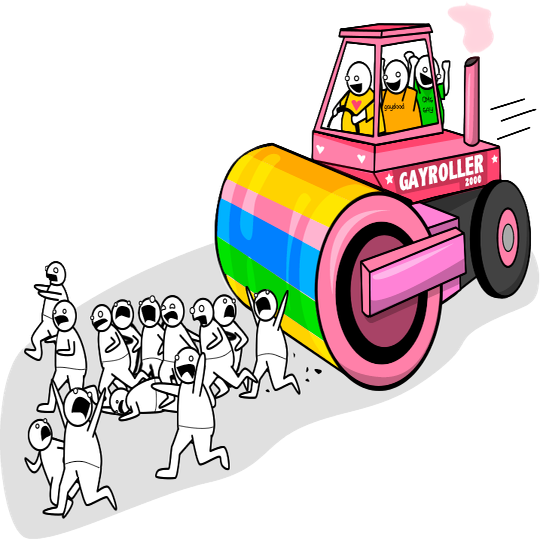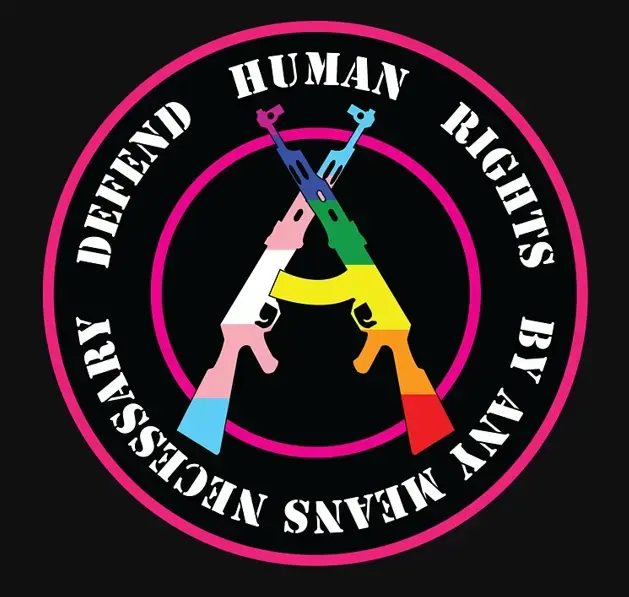I’m not sure if this is the best place but I don’t know where else I could talk about something like this. I know that my style of masculinity is toxic but I’ve never gotten good advice on how to overcome it as a trans man.
The assumption that trans men don’t have toxic masculinity because “they got socialized as women” is a common one in trans spaces and not only does it not apply to me, the implication that trans men are softer men pisses me off and digs me deeper.
Lore time: I internalized masculine norms throughout my isolated childhood. I knew and insisted I was a boy from an early age and my behaviour got me isolated and bullied by my female peers. I was also mistreated a lot for being queer.
My main problem is being insecure because of dysphoria combined with the transphobia I’ve received, pushing me to toxic competitive behaviour that runs the risk of alienating my friends. However, compared to the attitudes I’ve faced and still face in real life, affirmation from queer spaces about how men don’t need to be one way feel detached from reality. How can I not be insecure when I’ve been bullied for my whole life and none of that would’ve happened if my body wasn’t female? If I said that doesn’t matter wouldn’t it be cope?
Tl;dr what do when toxically masculine as a trans man in very transphobic irl corcumstances? I would especially appreciate examples of masculine-presenting men who didn’t engage in masculinity as a competition. If post is too big wall of text or just too many personal details tell me and I’ll trim.
Can you give examples of your toxic masculinity?
-I overreact when I see trans men who’ve made more progress than me, I think I made my (also ftm) boyfriend worse by trying to get my manhood validated which is what got me into wanting to fix it.
-I bury all emotions under anger, I’ve worked on this for a while and have gotten good at confronting/solving the original problem that makes me angry but I’m still very out of tune with other emotions.
-I have heated dudebro moments when I see trans men who actually want to be feminine. I know it’s nonsensical and fight it but the thoughts of “man up lol” are still there. This happens with cis men too, with the weird satisfaction of being more masculine than a “real man”.
-In general manhood feels like a competition where only the buffest tallest men get the male crown while the short incel peasants suffer. Any love or appreciation I get despite being short and not that far into transition feels like they are secretly saying “You should detrans and become a housewife lol”. I can get a compliment and still twist it to be insulting to my masculinity somehow.
-Talking about problems make me feel I’m not being a “real man”. I actively fight that one a lot but it still ends up making me keep my problems to myself until they all pile together and make me a lot worse mentally.
I overreact when I see trans men who’ve made more progress than me, I think I made my (also ftm) boyfriend worse by trying to get my manhood validated which is what got me into wanting to fix it.
this is honestly a thing for anyone medically transitioning. sometimes the dysphoria hits wrong and its hard to keep things going in a t4t relationship with it. if your dysphoria is different enough its easier to work with imo. i purposefully avoid selfie and surgery groups to avoid jealousy, i havent been able to get surgeries for things that have been fucking me up due to a sort of fucked up family situation (re: we are slavic / rural czechs and pooled our resources as normal but the family wont use these resources to help me even though i contributed a lot). its harder to do that in person, but maybe you can avoid certain topics with your SO, that might help
life isnt all a competition, some things take slower, and yes, that is more painful, but you gotta try to push against that impulse each time you think it. its not healthy for anyone. it should also help to not bottle this up and have a conversation with your SO about these struggles, you might be hear some surprisingly similar takes.
edits:
This happens with cis men too, with the weird satisfaction of being more masculine than a “real man”.
i get this too, especially if the woman is transphobic.
It seems like you’re just insecure in your identity (imposter syndrome is very common amongst trans folks) and you’re projecting. I don’t really have much in the way of advice about the insecurity aspect (I’ve been on hormones just over 4 years and still often feel like I’m not good enough and worry a lot about how others perceive me), but it seems that you have an awareness of your thoughts and behaviours and want to change them.
I would say, keep being mindful of yourself and challenging your behaviours when you notice them. Maybe some kind of support group could be helpful too, where you can see other people being vulnerable and hopefully learn to talk about your problems and insecurities and deal with them in a more helpful manner. There are quite a few (usually gendered) mostly allocishet groups in my area, though I personally feel much more comfortable in trans-only groups. The trans groups tend to break by age (-18, 18-25, 25-40, etc) and sometimes by trans masc / trans fem.
Damn dude, yeah your thinking process and emotions are def turning pathological here. Not a moral judgement, but this is going to hurt your well-being and happiness. But here’s the thing, you recognize it and you can even give concrete examples. That is one of the largest hurdles you can face when you’re trying to grow into the person you want to see, and that takes a hell of a lot of strength.
There’s several factors that are at play here that will help you address this: schemas that inform your automatic thoughts, wrestling with your own self image and the insecurity that it brings up, and hormones - testosterone is some nasty stuff when it comes to aggression. You’re also growing into becoming a man, it’s a process.
Reaching out for support here is a great first step. I can relate to this list, this was a lot of me when I was in the military, and in fact a big emotional drive for my young self to join up (dumb solution lol). I did however develop a better sense of self and my “masculinity” before I realized I was trans. This came from having a partner that regularly engages with me on topics of conscientiousness and empathy. These aren’t feminine traits, they’re prosocial behaviors. The other was going through therapy to address my patterns of thinking and emotional reactions and where they come from.
I would recommend both those things and also, find a good male mentor/role model to spend some time with. Take some time to experience a relationship with them that’s not a competition and where you can be safe without a pressure to perform. You’ll get there, it takes time.
other than the stuff about other trans men the rest of it sounds like normal man stuff. Not to say it’s super healthy but this is basically the shit ass emotional situation we all have to deal with.
if it makes you feel any better about your “manlier than a real man” thing I’m trans fem and frequently armwrestle cishet dudes at bars and then make fun of them when I win and have occasionally shot estrogen right in front of them afterwards to take the bit further. Being a toxic piece of shit can be really fun actually
I’m AMAB and now trans-NB but I used to be a CIS man struggling with insecure masculinity. I first discovered gender bending when I was cross-dressed by the leatherdykes I was living with. They’d put me into skirts and blouses and I feel an immediate transformation — I’d become quieter, more passive, and I’d spend most of my time cleaning after them and washing the dishes.
They complained at first about my behavior. “We think it’s problematic that your idea of a women is cleaning and washing dishes.” Which is true, that’s problematic. But they let is slide, they said, because they were getting free cleaning and dish washing.
It took me a lot of reflection to realized that my inner woman, because she was never expressed, had also never had a chance to develop through the discovery of feminism. It took me many years and a lot of feminist study to raise that part of my consciousness. It took another two decades for me to then start to deconstruct gender entirely and transition. It was a wild ride.
In short, it’s perfectly understandable to have an underdeveloped, under-socialized gender identity when first transitioning. And being aware of it puts you way ahead of most men who never question their toxicity. It will take patience and study to undo a lifetime of gender indoctrination and find your own expression.
In my work to be a better, more ethical man, I got into the New Age Man movement. This was decades ago and included work like Iron John by Robert Bly. This is some old-school shit and I don’t think it was very useful. I’ve had some contact with modern men’s movement (not MRA!) folks that lead me to believe it hasn’t improved much. I found it mostly a sort of “kinder, gentler” toxicity.
Honestly the book that I feel liberated me most was bell hook’s Feminism is for Everybody. hooks spends considerable thought on the impact of patriarchy on men. I no longer identify as male, but if you do and want to untoxify it, I highly recommend hooks.
“The first act of violence that patriarchy demands of males is not violence toward women. Instead patriarchy demands of all males that they engage in acts of psychic self-mutilation, that they kill off the emotional parts of themselves. If an individual is not successful in emotionally crippling himself, he can count on patriarchal men to enact rituals of power that will assault his self-esteem.”
“To create loving men, we must love males. Loving maleness is different from praising and rewarding males for living up to sexist-defined notions of male identity. Caring about men because of what they do for us is not the same as loving males for simply being.”
“Masses of men have not even begun to look at the ways that patriarchy keeps them from knowing themselves, from being in touch with their feelings, from loving,” hooks writes. “To know love, men must be able to let go the will to dominate. They must be able to choose life over death."
deleted by creator
deleted by creator





